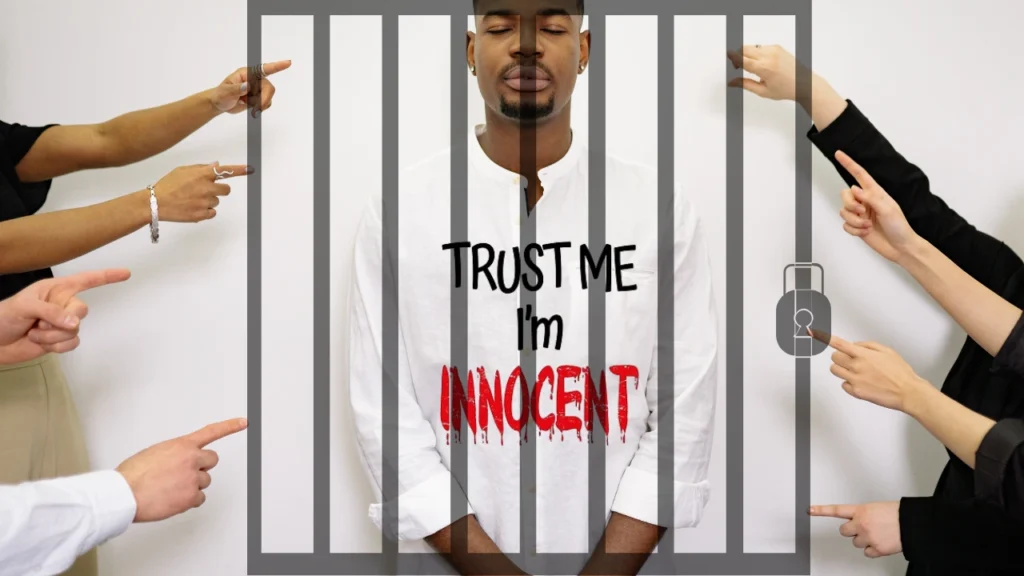What to Do If You’re Falsely Accused.Few things in life which feel more devastating than being falsely accused. A single claim whether whispered in the workplace, posted on social media, or filed in court can damage your reputation, strain your relationships, and even put your freedom at risk.
While being accused of something you didn’t do can feel stressed, there are clear steps you can take to protect yourself, clear your name, and even hold your accuser accountable. This blog will walk you through what to do if you ever find yourself in this difficult situation.
What to Do If You’re Falsely Accused-Overview
| Article on | What to Do If You’re Falsely Accused |
| Stay Calm | Avoid confrontation and keep control of emotions. |
| Hire a Lawyer | Get professional legal support to protect your rights. |
| Collect Evidence | Save documents, messages, and records to prove innocence. |
| Question Credibility | Highlight inconsistencies or motives of the accuser. |
| Seek Compensation | Pursue damages for lost income or emotional harm. |
Stay Calm and Avoid Confrontation
Your first instinct may be to lash out or confront the person accusing you, especially if the claim is outrageous or deeply personal. But reacting emotionally can backfire. Anger or panic can be misinterpreted as guilt or hostility. Instead, take a deep breath and focus on staying composed. Calmness allows you to think more clearly, make better decisions, and show others, which includes the investigators, employers, or a judge that you are rational and reasonable.

Seek Legal Representation Immediately
One of the most important steps you can take is contacting an experienced attorney. If the accusation involves a crime, you should seek a criminal defense lawyer right away. If it is a matter of reputation, such as slander or libel, a lawyer specializing in defamation law is best suited to help.
- Explain your legal rights and options.
- Communicate with investigators or opposing parties on your behalf.
- Help you gather and present evidence to prove your innocence.
- Protect you from making mistakes like saying something offhand that could later be twisted against you.
Document Everything
Evidence is your greatest helper when you are wrongly accused. Start documenting everything as soon as possible:
- Save text messages, emails, and voicemails.
- Write down dates, times, and details of any relevant conversations or incidents.
- Keep records of where you were and what you were doing at the time of the alleged event such as receipts, location data, or witness statements.
Challenge the Accuser’s Credibility
Sometimes, the best defense is showing that the accuser cannot be trusted. If they have a history of dishonesty, a personal motive against you, or inconsistencies in their statements, these facts can be brought to light.
For example, if someone falsely accuses you at work because they are competing for a promotion, your lawyer can demonstrate their bias. If their story keeps changing, that inconsistency can also work in your favor.
Understand Defamation and Your Right to Sue
False accusations don’t just hurt emotionally as they can also have legal consequences for the person spreading them. If someone damages your reputation by making untrue claims, you may be able to sue for defamation.
Defamation comes in two basic forms:
- Slander: Spoken false statements.
- Libel: Written or published false statements.
To win a defamation case, you generally must prove:
- The statement was false.
- It was shared with others.
- It caused harm to your reputation, career, or well-being.
Malicious Prosecution: When False Accusations Lead to Court
Sometimes, false accusations escalate into legal action and maybe you were arrested, or someone sues you in civil court.
To succeed the individual must know the following things:
- The accuser initiated the legal process against you without proper cause.
- The case ended in your favor.
- They acted with malice or intent to harm.
- You suffered damages, such as legal fees, lost wages, or emotional distress.
Social Media and Public Opinion
False accusations spread faster online. By the power of social media a single post can reach millions of people in minutes which causes instant reputational harm to the individual. While it may be tempting to post a public defense, this often does more harm than good. Anything you say could be screenshotted, taken out of context, or used against you later.
Potential Compensation for Damages
If you win a defamation or malicious prosecution case, you may be entitled to compensation and the damages can include:
- Lost income or job opportunities.
- Medical expenses related to the treatment of stress or mental health.
- Pain, suffering, and emotional distress.
Protecting Your Future
Being falsely accused can feel like your life has been turned upside down, but it does not have to define your future. In some cases, you can even seek to have records sealed after proving your innocence, which helps to prevent the accusation from following you for years to come.
Final Thoughts
The key is not to let fear or anger dictate your response. Stay calm, hire a competent attorney, gather evidence, and explore your legal options. Whether through defamation claims, malicious prosecution suits, or simply clearing your name in court, there are ways to fight back and reclaim your life.
| Home Page | https://sbbarristers.com/ |
FAQs for What to Do If You’re Falsely Accused
Ques.1. What if false accusations led to my arrest?
You may be able to file a malicious prosecution claim after the decision of court but it should be in your favour.
Ques.2. Should I respond on social media if I am falsely accused online?
Usually no, it’s best to let your attorney advise on whether to respond publicly or stay silent until the matter is resolved.
